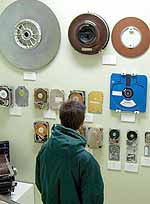Evidence 3 of Competency C
In which I show my understanding of cultural and economic dimensions of information use. The text on this page is the relevant excerpt from from the Final Exam of the Information and Society class, Spring of 2005. Below is the link to the full document, which consists of four essay questions.
This document is in iPaper format, which requires ADOBE FLASH PLAYER to view it. Clicking on [PDF] link the document will open in ADOBE ACROBAT READER.

Assortment of computer hard discs and storage devices. Exhibit in COMPUTER MUSEUM, San Diego, California.
The picture was taken in 2004, in the meantime the museum was closed and its collections donated to
SAN DIEGO STATE UNIVERSITY LIBRARY.
Photo Vlasta Radan, 2004.
Q2. Given what you know about today’s information world, which of the authors studied in this course are/were visionaries and why?
It would really be difficult to decide who is more visionary, Drucker (1994) or Crawford and Gorman (1995). The appeal of Crawford and Gorman is in their argument that nothing really changes by the change of technology. To an aspiring librarian, it is comforting to think that the change of technological environment does not change the "eternal mission of libraries – to collect, preserve, organize, and disseminate the records of the knowledge and information of human kind" (Crawford and Gorman, 1995, p.183). However, Drucker (1994) shows that this time in history it is not only technology that is changing, but the whole social concepts with which we lived the last few centuries are also changing and, with that, the whole concept of our social organization. And regardless of the comfort provided by Crawford and Gorman, I am afraid Ducker is right in his assessment.
If we are analytical observers of our everyday life, it is clear that technological changes we are seeing are going beyond better microprocessors, better communications, or better health care. The society itself is undergoing dramatic shifts. The way we live, the way we work, and the way we understand other people is dramatically different than that of our parents. All fundamental frameworks in which we used to describe ourselves change together with new technology. The better access to the information and knowledge, and the speed with which some information could be spread or disseminated changes the dimensions of our world.
The new society that all these technological changes are enabling, the "knowledge society" as Drucker labels it, creates new values that are based on knowledge and skills one acquires and keeps acquiring during one's lifetime. An educated person will not be any more somebody who earned a degree but one "who has learned how to learn, and who continues learning, especially by formal education, throughout his or her lifetime" (Drucker, 1994, p.7). No more is there a definite set of the skills or one definite learning period when we learn what we would need to take us through life. The real advantages developed countries have are not any more monetary (capital) or industrial – it is the way of acquiring knowledge and the educational system. Drucker argues that, although industry would not disappear, this is not any more where power resides. The knowledge – knowledge how to learn -- is where the hope for humanity is. And besides schools and educational system in general, the libraries are inevitable knowledge resources of future society.
Reference:
Crawford, W. and Gorman, M. (1995). Successful libraries make their own luck. In Future libraries: Dreams, madness & reality. Chicago: American Library Association. Chapter 12.
Drucker, P. F. (1994). The age of social transformation. The Atlantic Monthly, 274(5), 53(18).
This web site was developed to satisfy the graduation requirements for
the School for Library and Information Science at San Jose State University California
Text, design, and digital imaging by Vlasta Radan